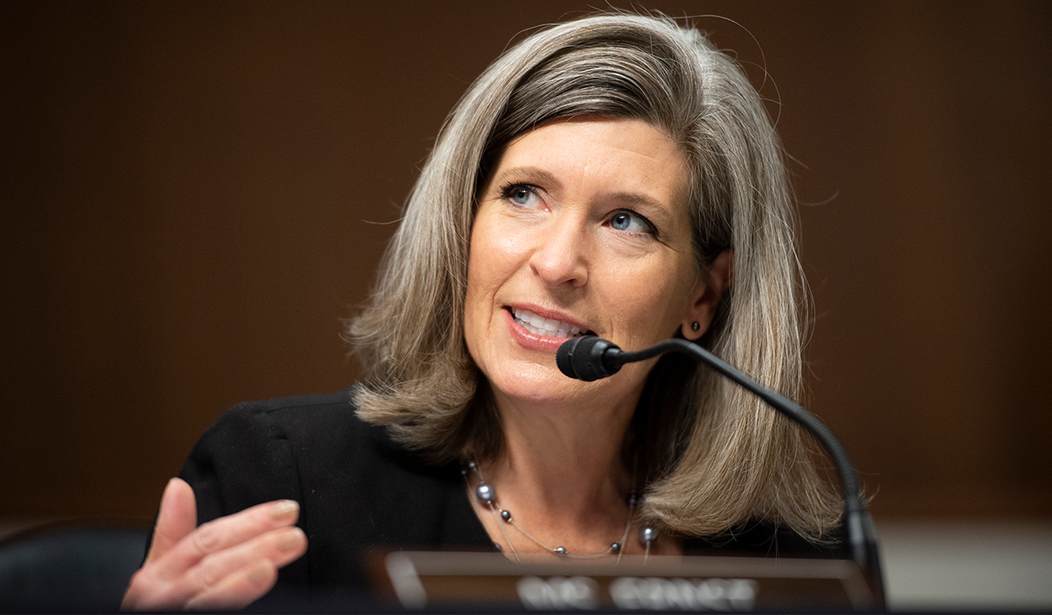U.S. Senator Joni Ernst (R-IA) has found yet another problem with the way President Joe Biden is running the federal government, this time with the endless and essentially unrestricted telework privileges for federal bureaucrats that have had unknown negative impacts on productivity and the ability of federal employees — also known as public servants — to serve the public.
In addition to a fully unknown impact on the quality of work provided by federal agencies who are supposed to be serving the American people, allowing remote work on a sweeping scale means federal buildings — being leased on the taxpayers' tab — are sitting mostly empty while still running up electric, cleaning, and other bills.
Part of the problem Ernst has identified is that, as with most bureaucratic blunders, there's no clear data on how many federal employees are even working in offices and how often they're doing so. To address the issue, learn more about how taxpayer dollars can be saved, and do something to address lagging performance from public servants, Ernst has a plan.
To start, Ernst sent letters on Tuesday to the inspectors general of all federal agencies requesting investigations to discern what impact remote work has had on the ability of the federal government to provide services, how much money could be saved for taxpayers by consolidating offices that sit empty, what — if anything — has been done to adjust federal employees' location-set salaries for anyone who has relocated and chosen not to work from an office, and what the worksite attendance rate is for the employees at each agency.
In her letters (one example embedded below) to agency IGs, Ernst notes that "[r]emote work provides federal agencies with an opportunity to reduce costs for taxpayers and increase the ability to recruit and retain talent for public service," but those "arrangements only work for taxpayers when telework does not (1) harm the agencies’ ability to achieve their mission, (2) adversely impact the timely delivery of quality services, or (3) impede or impair the management of the federal workforce and taxpayer money."
Recommended
Citing one example from the United States Patent and Trademark Office, an agency where officials claimed allowing more remote work "is saving tens of millions of dollars in reduced operating costs" and saved roughly $30 million each year by downsizing the amount of leased office space," Ernst warned that the result of allowing telework isn't all positive.
From Ernst's letter:
However, a series of investigations by the Department of Commerce Office of Inspector General (OIG) found USPTO’s lax oversight and inadequate internal controls of telework has costs millions of dollars for unpaid work and contributed to a patent application backlog. After a tipster called out a patent examiner who “never shows up to work” and whose work is “garbage,” it was determined the employee was paid $25,000 for 730 hours not worked. He was instead playing golf, shooting pool, and going to happy hour. A subsequent larger review of telework over a nine-month period found USPTO “failed to receive nearly $8.8 million in work product that would advance its mission and lessen the patent application backlog by an estimated 7,530 cases.” The OIG noted these are conservative estimates and the true costs “could be twice as high.” Additionally, more than 4,000 examiners paid for unsupported hours received above-average ratings on their annual performance reviews.
With evidence presented in the USPTO case, Ernst says it's been demonstrated that "telework practices can and should be reviewed for cost savings, impact on services, and quality control of management" but noted "other agencies have not adopted obvious operational cost saving measures and the administration has not set clear standards or expectations to improve management and prevent abuse."
What is known about the remote and telework practices of federal employees? For starters, Ernst pointed to data showing "five percent of the pre-pandemic federal workforce swiped-in to a government-leased office in the Washington, D.C. area on an average workday during a two-month period in the fall of 2022." In addition, "[s]eventy-five percent or more of the available office space at the headquarter buildings of 17 different federal agencies is not being used."
So, where are the public servants who used to fill these office spaces? In one case mentioned by Ernst, "a manager responsible for overseeing a team who helps veterans schedule appointments at the Atlanta VA Medical Center—which has one of the longest wait times to see a doctor in the country...bragged on Instagram about relaxing in a bathtub for an hour while on the job" with a post in which "his government-issue laptop is opened to a staff meeting while his legs are soaking in a tub with a caption stating, 'MY OFFICE FOR THE NEXT HR.'"
"Growing up on a farm, I knew what working from home actually means," Ernst remarked as she fired off her letters seeking new information to hold the government accountable and ensure it is being good stewards of taxpayer dollars — a never-ending quest that can sometimes seem quixotic but must be pursued regardless.
"It’s not fair to let the responsibilities of running an agency — and the country — fall on the shoulders of the hardworking public servants who are showing up while others are out golfing on the taxpayer’s dime," noted Ernst. "Frustrated Americans are being put on hold while too many federal employees are phoning it in," she continued. "I’m calling out federal employees who refuse to answer the call of duty to return to work on behalf of taxpayers, veterans, seniors, and our great nation. It’s time to get back to work."
A sample of Ernst's letters with the full list of questions to which she wants answers — this one to the State Department — is embedded below:

























Join the conversation as a VIP Member